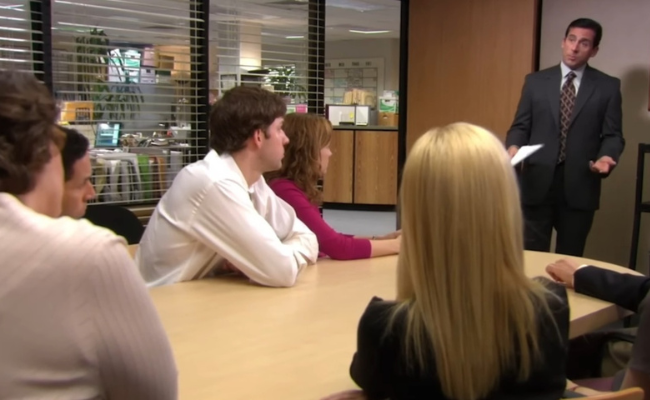Office etiquette 101: Avoid these passive-aggressive phrases at work

Still from “The Office” (2005)
So, you’ve (successfully) overcome the treacherous process of job hunting. You’re now ready to conquer the workplace—with visions of teamwork and collaboration dancing in your head.
Avoiding office drama sits atop your priority list, and you’re confident about your harmony-preserving skills. After all, you’ve already mastered the art of conflict avoidance—thanks to the people who constantly whisper “take the high road” and “be the bigger person” every time you’re about to go off.
But the thing is, too much peacekeeping can lead you down a rabbit hole of more problems, especially if you resort to unhealthy tactics to do it. Case in point: passive-aggression.
In essence, passive-aggressive behavior is covert hostility. It’s a less direct way of expressing annoyance or dissatisfaction, and may come in the form of snide remarks, veiled criticisms, and backhanded compliments. It’s the silent killer of workplace harmony, productivity, and overall job satisfaction.
And guess what? Even the most non-confrontational peacemakers may be guilty of occasionally indulging in such behavior. So, to help you steer clear of this toxic path, here are some passive-aggressive statements you should avoid using at work. (Remember, though: Context always matters, so these examples should serve as mere cautionary tales.)
“Fine, I guess” (or “If that’s what you want”)
Situation: Your co-worker suggests an approach that you’re not entirely on board with. But instead of engaging in healthy discourse, you reply with a dismissive “Fine, I guess,” or its equally passive-aggressive cousin “If that’s what you want.”
Potential damage: You might think you’re being diplomatic for saying that, but in reality, it reeks of indifference. This can leave your workmate feeling dismissed and undervalued, which—over time—can erode trust, teamwork, and open communication. It also leaves room for resentment to fester.
“I’m surprised you didn’t know that”
Situation: During a meeting, a colleague asks about a topic you consider common knowledge or something you think they should already know. You answered them, but not without adding a condescending “I’m surprised you didn’t know that” at the end.
Potential damage: Not only does it belittle your co-worker’s intelligence or competence, but it also sets a tone of arrogance and superiority. It breeds a culture of insecurity where individuals become hesitant to ask questions (or seek help) for fear of being judged. This may hinder growth in the long run, as everyone becomes more focused on avoiding embarrassment. Besides, people have different levels of expertise—what you consider “basic” might be a learning opportunity for someone else.
View this post on Instagram
“I told you so”
Situation: The team is working on a project. Despite your reservations, you reluctantly went along with the decision made by the majority. When things inevitably go south, you can’t resist the urge to comment, “I told you so.”
Potential damage: While you may feel a fleeting sense of vindication, this passive-aggressive statement can poison team morale and dynamics. It’s a blatant disregard for the collective decision-making process and an attempt to shift blame onto others. It fosters unhealthy competition within the team, where everyone’s concerned about being right instead of working together to find solutions.
“That’s how we’ve always done it”
Situation: A new employee suggests a change in a longstanding process or a more efficient way of doing things. Your response? An unenthusiastic “That’s how we’ve always done it.”
Potential damage: This phrase is a creativity killer. It stifles innovation and implies resistance to change. While there may be valid reasons for sticking to old practices, shutting down new ideas with this passive-aggressive reply can make the workplace feel stagnant. It may also imply that hierarchy and tradition trump progress and improvement.
“It’s not a big deal”
Situation: Your colleague is visibly upset about a work-related issue, and they confide in you. Rather than validating their feelings or offering advice, you brush off their concerns with a nonchalant “It’s not a big deal.”
Potential damage: Stripped off the sugar coating, this statement may also be interpreted as “You’re overreacting.” It can lead to strained relationships, as people would hesitate to open up to you or seek your support when they genuinely need it. Showing empathy and acknowledging the importance of your colleagues’ concerns are vital—yes, even if you don’t see eye to eye.
You may also like: Remote career advice – how to build up your job
“I was just kidding”
Situation: During a team lunch or a casual conversation, you make a biting remark about a co-worker’s personal life. When you notice their discomfort, you hastily add, “I was just kidding.”
Potential damage: While humor can be an excellent way to build rapport, saying “I was just kidding” attempts to escape accountability for your snide comments—intentional or not. It can leave your workmate questioning your sincerity and wondering if you’ll say something hurtful again. This may even lead to a tense and hostile workplace environment.

